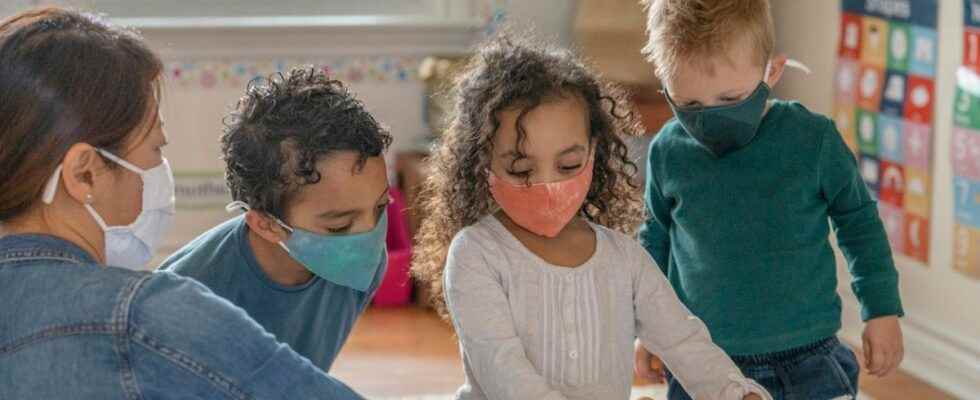Published ,
Reading 3 mins.
The British authorities have worked on the subject and are seeing learning delays among toddlers, following the Covid-19 pandemic and its consequences. What about in France? Have the children also been penalized by the various confinements? The answers of Dr Laure Bortoli, general practitioner, specialist in early childhood and national referent of the association Acting for early childhood.
English Child and Education Services, Ofsted (the Office for Standards in Education, Children’s Services and Skills, which is a UK state body specializing in education and childhood) has just published a report on the impact of the Covid-19 pandemic on children and their learning.
Language and learning delays
And the report is damning: the professionals noticed that the children had various delays, concerning the acquisition of the language or the walk.
For example, children have difficulty recognizing emotions because of faces covered by masks, have learning delays for common acts of daily life (putting on their shoes, putting on their coat, etc.) and have difficulty socialize. These delays are for professionals, caused by the various confinements, which have also been a source of increase in their time spent in front of the screens.
What about in France?
In France, the observation could be substantially the same. According to a survey conducted by Opinion Way for Fischer price in collaboration with the association Acting for early childhood: “60% of parents fear at least one negative effect of the crisis on the development of their children under the age of 3 and 40% have already noticed at least one of these negative effects, first and foremost impacts on the relationship they have with the outside world, on their acquisition of language and on their mood”.
Early childhood professionals were also questioned and 41% have already reported effects on language learning for children under 3, while a third note effects on the socialization of these children.
A finding that is not surprising
Asked about the question, Dr. Laure Bortoli, general practitioner specializing in early childhood, is not surprised by these results. “It is not surprising to see that some children can present learning delays. This is due to the changes that the pandemic has brought to us. For example, the children learned less well to read the emotions on the face, because of the mask. This is an observation made by nursery staff: children’s attention is more difficult to capture, the same goes for language because these children have less imitated adults by not seeing the shape of the mouth and lips.explains the specialist.
What could be done to fix it ?
Fortunately, children are able to catch up, thanks to the brain plasticity they naturally possess. “Up to six years, all the delays can be made up, nothing is lost” reassures Dr. Bortoli. “If you notice that your child has a language delay, for example, talk to him. Take advantage of every moment you spend with him to talk, name things, talk about his day…”.
Consult a GP online
Do not hesitate to consult if necessary
Similarly, she advises parents to spend quality time with their child. “It’s not necessarily long, but it’s a time that we devote to them, we tell them that we are going to play with them, that we are available. This will help the child focus on a game, and improve their concentration skills.”. Finally, Dr. Bortoli recommends that parents reduce children’s screen time and not exceed half an hour a day. “Instead, let your children play in their room. Nothing beats games that let their imaginations develop or imitation games, such as dolls or manual games. And in the slightest doubt, do not hesitate to speak to the doctor who follows the child.. she concludes
